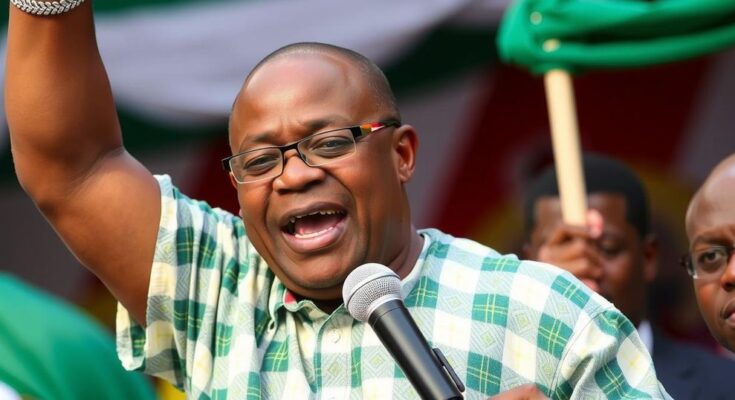John Mahama, the opposition leader, won Ghana’s presidential election, securing 56% of the vote against ruling party candidate Mahamudu Bawumia’s 41%. The election highlighted voter frustrations over economic mismanagement, leading to discontent with the outgoing NPP government. Mahama’s victory ends an eight-year tenure for the NPP, with the newly elected leader promising significant economic reforms.
In a significant political upheaval, Ghana’s opposition leader, John Mahama, emerged victorious in the recent presidential election, defeating ruling party candidate Mahamudu Bawumia. Mahama garnered 56 percent of the votes, while Bawumia received 41 percent according to the electoral commission’s announcement. This victory suspends eight years of New Patriotic Party (NPP) governance, characterized by economic challenges and discontent among voters following high living costs and a national debt crisis.
During his acceptance speech, Mahama acknowledged the difficulties faced by Ghana under the previous administration, stating, “These eight years have witnessed some of the darkest periods of our governance.” He pledged to implement reforms and restore economic stability, noting that “the journey is not going to be easy… because the outgoing government has plunged our dear nation into the abyss.”
The election turnout was reported at 60.9 percent, a decline from 79 percent two years prior. As Mahama is set to reshape the nation, he faces scrutiny regarding his own past administration’s economic challenges. Meanwhile, despite his defeat, Bawumia recognized the electorate’s desire for change, affirming the NDC’s parliamentary success while conceding the presidential race in light of voter discontent with the NPP’s performance.
Ghana has a historical record of robust democratic governance, with its major political parties—the National Democratic Congress (NDC) and the NPP—alternating in power since the reintroduction of multi-party politics in 1992. The recent election was propelled by widespread dissatisfaction with the government’s economic strategies, which faced scrutiny due to inflation and currency devaluation amidst a debt crisis. Mahama capitalized on public frustration for change, aiming to shift Ghana’s political landscape while contending with his prior tenures’ memories of economic strife.
The election victory of John Mahama serves as a clear indication of voter sentiment against the ruling party’s management of the economy. His leadership promises to confront the challenges inherited from an administration grappling with significant economic setbacks. As the country turns a new chapter, Mahama’s past experiences will undoubtedly influence his approach to governance in a bid to foster recovery and growth.
Original Source: www.france24.com




